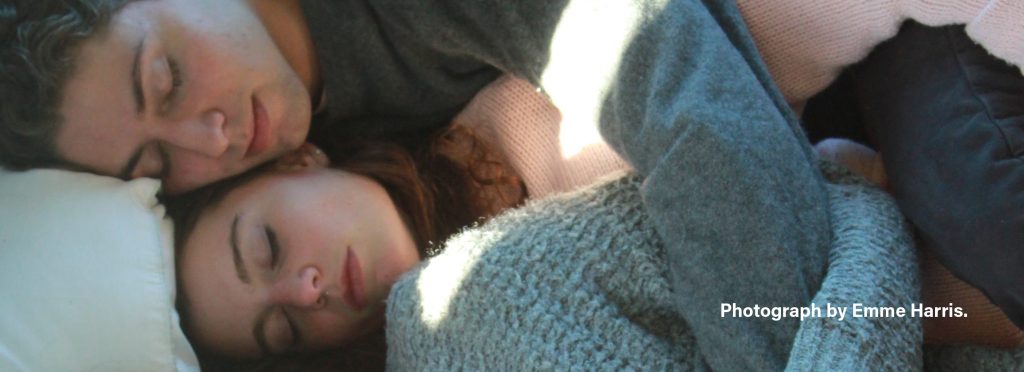Let’s talk about intimacy. It’s that gross word your mother uses to ask you if you’re having sex, but remove sex completely from the picture for a second.
Dictionary.com defines intimacy as, “a close, familiar, and usually affectionate or loving personal relationship with another person or group.” Well, intimacy and consensual touch can now be bought and paid for.
Cuddling in order to heal psychological wounds or anxieties is the latest trend sweeping the nation.
“I have an equal passion for business and the concept of yoga and finding out who you are and sort of anything related to that. That intersection of spirituality, business, and health and wellness is the Cuddlist,” says Adam Lippin, the founder of the Cuddlist—an online business that allows users to, after extensive screening, pay to snuggle with a professional cuddlist.
Cuddlists are trained professionals stationed around the world, often former massage therapists or psychotherapists who have become Cuddlists because they knew many of their clients really needed physical affection; however, within the boundaries of their own professions, this is illegal.
The Cuddlists go through an 8-10 hour online training course combined with a mandatory cuddle session with a certified and employed Cuddlist. The pre-existing Cuddlist evaluates the candidate at the end of the session. Through this training they are taught how to be psychologically present with other people as well as how to facilitate conversation about consent. This means teaching people how to be verbal about what do or don’t like regarding physical touch.
“I have an equal passion for business and the concept of yoga and finding out who you are and sort of anything related to that. That intersection of spirituality, business, and health and wellness is the Cuddlist,”
“If you are a potential client, then you would go to our website and read our code of conduct, then search by location for a particular Cuddlist,” says Lippin. Small biographies about the Cuddlist coupled with photographs of them are available online so the client can find his/her perfect match. The complexity lies in the need for cuddling, which is ultimately something quite beautiful.
“My underlying philosophy was that human connection is the most important thing we have,” Lippin explains. “So how do I help foster that?”
People do not venture to the Cuddlist to find sex. “I think it is more than possible to separate intimacy from sex. I have experienced it and I have seen multiple people experience it,” says Lippin. Many people who inquire about a session are suffering from depression, anxiety or other forms of mental illness, or are survivors of sexual assault.
Once the process of finding a Cuddlist is complete, the client requests a session with the Cuddlist and signs off on the code of conduct. These extensive rules ensures the safety of the Cuddlist and client. It outlines the boundaries of the cuddling sessions and the importance of verbal consent throughout each session. It even outlines where the Cuddlist may or may not touch a person and addresses what both parties must be wearing.
“I guess the thing that I try to impress upon people is that, especially when you are in your 20s and 30s, you’re really conditioned for sex. But once you’re in your 50s and 60s and sometimes older and you have had some loss, there comes a point when sex doesn’t serve them anymore,” says Lippin.
“At that point the request is sent to the particular Cuddlist’s email and they will respond to the potential client. And depending on what the Cuddlist needs to do, they screen the client to make sure that he or she is appropriate for them, and vice versa—be that a phone call, an email, or a meeting in person,” says Lippin.
The next step is to meet with the Cuddlist for the session. This happens at the client’s or Cuddlist’s home, depending on where both parties feel comfortable.
“I guess the thing that I try to impress upon people is that, especially when you are in your 20s and 30s, you’re really conditioned for sex. But once you’re in your 50s and 60s and sometimes older and you have had some loss, there comes a point when sex doesn’t serve them anymore,” says Lippin. “People are looking for a connection. It’s not a sexual thing.”
Cuddling is following in the footsteps of other healing models that were previously not recognized or completely discredited by mainstream society. For example, acupuncture and alternative medicine are only recently more widely recognized as legitimate wellness practices. Lippin’s ultimate goal is to have cuddling medically accepted and covered by insurance. Before this can happen, he must change people’s ideas about the “cuddling market.” Currently, paying someone to cuddle seems a bit taboo and isn’t often thought of as reputable. Lippin aims to shed new light on the business.
“Holding someone and healing someone and having them feel your breath… There’s a sort of magic to it. It’s energy, pure energy,” says Lippin.
In the near future, the Cuddlist will participate in a study conducted by the University of San Diego. The school will examine the ethics of cuddling and the effects it has on people. Prior to cuddling, the participants will fill out an evaluation answering questions ranging from their likes and dislikes to a sliding scale of their mood. For example, participants will rank their compassion for others and the amount of positive and negative emotions they are feeling at the moment of the evaluation. They’ll fill out the same evaluation after their session.
The study’s goal is to provide the business with areas of improvement as well as concrete evidence that cuddling can be, in fact, a healing modality for many.

